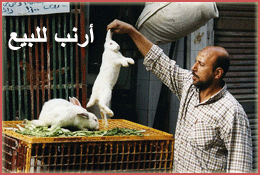-
 Haneen saysSat 13th Sep 08@11:54 pmHey guys...this one is clever. Good words in here. Two quick questions: Since you're offering us "dude", what's a female equivalent (chick, mumkin? ?يا ام البانات) When do you use moo vs. mish, or are they interchangeable? Shukran!
Haneen saysSat 13th Sep 08@11:54 pmHey guys...this one is clever. Good words in here. Two quick questions: Since you're offering us "dude", what's a female equivalent (chick, mumkin? ?يا ام البانات) When do you use moo vs. mish, or are they interchangeable? Shukran! -
Ahlan Haneen;
It really varies depending on the situation and who is saying it to who. In the Arab countries, the environment is more conservative than the west when it comes to male talking to female and the other way round, therefore (أختي - u7'ty) which is (sister) is commonly used. However, a nice word that a boy can call a girl is (صبية - Sabeyeh) it means (young girl), so if you see a girl seems to be (somehow) young, then saying (9abeyeh) to her would be nice, specially if you make her younger ;) . If they were two girls and the situation is similar to the one in the lesson, then she can say (يا حلوة - ya 7elweh) which is like (O sweety) :)
About (Moo) and (mish/mosh), both can replace each other, remember they are colloquial and simply one is used more that the other in certain areas.
Hope all points are clear. -
Ahlian Ehab
Nice lesson indeed.
I have one question:
1)If we would like to convert word like "kam"
into more colloquial ,can I use "qaddesh"
Qaddesh al-qerd?
I am looking forward to seeing your video soon
Are you planning to record something.
I really like them and they are very usefull
Many thanx
Good-bye
Czarek -
Yes Czarek; Qaddeesh is the colloquial way of saying (how much/many). Your example (Qaddeesh al-qerd?) is right, however, it is better to add the word (ثمن - thaman) or (حق - haq) which means (price)in between, so it becomes (Qaddeesh 7aq al-qerd?) Anyway, it is not a problem if you don't because colloquial is flexible in such issues while classical Arabic is the one that has the proper rules applied.
Keep it up with ArabicPod and you'll find more videos and features coming soon.
Bettawfeeq -
I called my husband, who is Lebanese, AbouShabab the other day and he said they never use that in Lebanon. Don't know if you know that or if it's just that he's been away from home for too long. Apparently, it's not useful in Lebanon.
Too bad because I liked calling him that. haha -
Hay leahc,
Agreed Abu shabab is probably not used around Lebanon, it's used mostly in the Gulf States like Emirates and Saudi. Nevertheless, it’s a cool phrase and it will be understood in Lebanon even though it’s not widely used, so keep on calling your husband abu shabab :-) -
I know that this is an ancient episode, but it is one of my favorites. I just noticed today a mistake in the PDF. In the vocab, you have the my in my brother highlighted, but then in the Arabic, you have the alif highlighted, as if that was what makes the word possessive. Not trying to nitpick, just thought I would point that out, abu Shabaab.
-
@ durruti
You're right. That error definitely ought to be corrected.
There is something else that is bothering me. Look at the last word in the first line of the transcript. There is a shadda above the "faa". If, however, you look up the word for "low" in the Lessan or "Speak Arabic quickly" dictionaries you will notice that "munkhafid" is spelt without a shadda.
To make matters worse, there are odd discrepancies in the Lessan dictionaries. The adjective under discussion is spelt differently in the German and Spanish versions. If you look closely at the letter "faa" you'll see what I mean. -
@durruti, Desmond, We have corrected the highlight issue in the transcript with أخي. We have also corrected the pronunciation text for منخفض, it should be spelt without a shadda, but please try to concentrate more on the Arabic text than the pronunciation. There's a reason why the text size of the pronunciation is smaller than the others in the latest transcripts. We don't want people to rely on it, it's just there to help beginners with the pronunciations, but we've learnt that some tend to rely on it and ignore the Arabic text all together even when they can actually read the Arabic text.
-
@ Mohamed
Thanks for your prompt reply. I think it would be useful to employ the adjective "munkhafid" in another podcast and draw attention to the plural "munkhafiduun". The more often we hear such words in different contexts, the better. Most learners tend to forget lexical units that they only encounter once.
Lower Intermediate - Rabbit for sale
| September 13th, 2008 | 1 comment |
Somebody's off to the market with a rabbit to sell in today's lower intermediate podcast. A customer asks a slightly odd question, perhaps it's his idea of a joke or maybe he's just plain rude! Use your imagination and let this 'silly' little dialogue aid you in learning some all important everyday words in the Arabic language.
 |
 MP3 Download MP3 Download
 PDF Transcript PDF Transcript
|
 Audio Transcript Audio Transcript Exercise Exercise |
|
| Basic | Premium | |
|---|---|---|
Join the Discussion

Random Word
لماذا |
|

Advertisement


